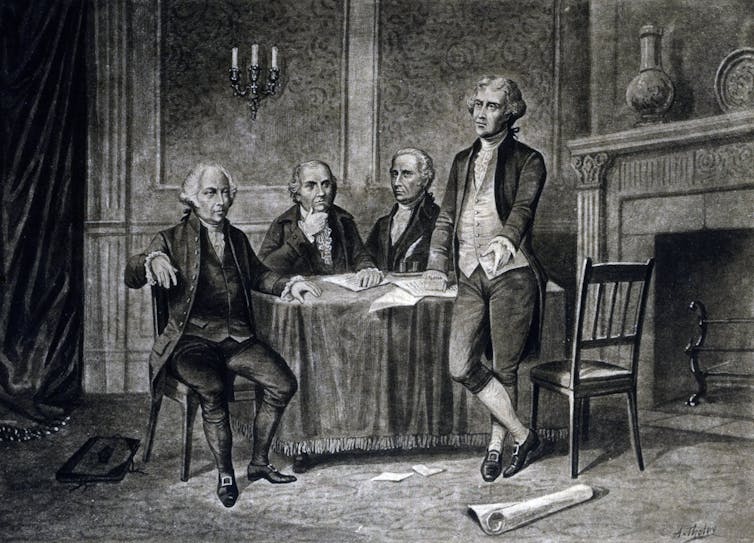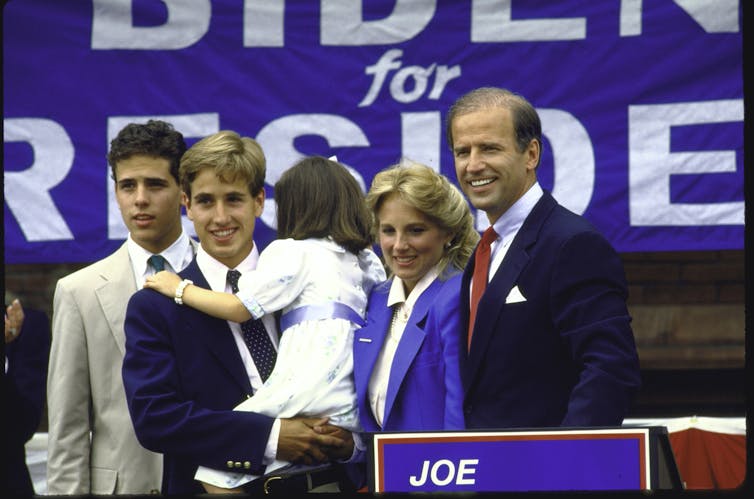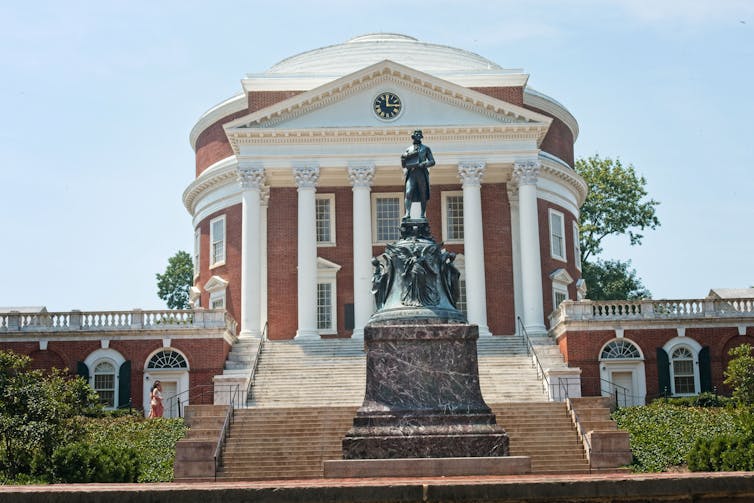
Experts in autocracies have pointed out that it is, unfortunately, easy to slip into normalizing the tyrant, hence it is important to hang on to outrage. These incidents which seem to call for the efforts of the Greek Furies (Erinyes) to come and deal with them will, I hope, help with that. As a reminder, though no one really knows how many there were supposed to be, the three names we have are Alecto, Megaera, and Tisiphone. These roughly translate as “unceasing,” “grudging,” and “vengeful destruction.”
Just now as we are waiting for reams of motions to be put forward and adjudged before jury selection can begin on even the earliest scheduled trial, I thought it might be a good time to address President Biden’s age, which has everyone so concerned (and not just the “concern trolls.”) Many people appear not to have noticed that different people age at different rates. That has always been true. Age has also always been looked at through two lenses. On the one hand, there is loss of physical and sometimes mental ability. On the other, there s experience – which has always been considered a plus. And now, at a time when there are so many with absolutely no political experience who think they can govern, experience is more important than ever. But don’t take it from me. Take it from our founding fathers.
==============================================================
80 is different in 2023 than in 1776 – but even back then, a grizzled Franklin led alongside a young Hamilton

Photo12/Universal Images Group via Getty Images
Maurizio Valsania, Università di Torino
President Joe Biden’s announcement that he’s running for another term raises concerns for many Americans. At his potential second inauguration, he would be 82, beating himself in becoming the oldest among American presidents.
Aging has changed dramatically over the centuries. Medicine and better lifestyles have significantly diminished the effects of time.
In the past, things were much different. In 1783, for example, at age 51, Gen. George Washington resigned his military commission and took a hard look at himself.
What he saw was a wreck – nearly a Methuselah. He had grown, in his famous statement, “not only gray, but almost blind in the service of my country.”
As a biographer of Washington, I can assure you that his well-known description of his condition may have been a bit of an exaggeration. Washington wasn’t that old, really, although the average life expectancy in that era was 38.
Old people today, so to speak, are much younger than they used to be, especially when they are wealthy. The field of anti-aging is waxing, and data suggests that science might be able to extend not only life span, but also the years a person remains healthy and free from disease. Furthermore, a youthful frame of mind can have a powerful effect, increasing longevity.
But no matter what, 82 remains a high number.

The Chronicle Collection/Getty Images
Old ‘machines,’ giving way
Americans have long nurtured mixed feelings about age and aged leaders. For starters, the men who fought in the Revolution and molded the young nation were themselves very young.
Alexander Hamilton, the mastermind behind the Constitution of the United States, was only 30 when he attended the famous Philadelphia Convention, where that document was written.
In opposition to “the Old England vices,” America was envisioned as springing out from the creativity of the young. It represented huge potential.
“Great Britain has past the Meridian of her Day,” wrote Edward Rutledge, at 26 the youngest delegate to sign the Declaration of Independence. And while England was old beyond recall, “we are young,” he concluded.
During a period when medicine and knowledge of human anatomy were all but rudimentary, old age terrified everyone.
“Our machines have now been running for 70. or 80. years,” an old Thomas Jefferson, age 71, explained to an even older John Adams, age 78, “and we must expect that, worn as they are, here a pivot, there a wheel, now a pinion, next a spring, will be giving way.”
People in their 70s were usually decrepit when the American nation was young. But it would be wrong to assume that the founding generation simply despised old age. Young America admired venerable old sages – Moses of the Bible, first and foremost.
In August 1776, a debate for designing a new great seal for the republic took place. A commission was formed, and Benjamin Franklin, a member of the commission, proposed to draw a Moses, with his wand lifted, in the act of dividing the Red Sea, and the pharaoh, in his chariot, overwhelmed with the waters. Franklin also suggested a motto: “Rebellion to Tyrants is Obedience to God.”
Like Washington and Jefferson, who led a revolution against a tyrannical king and his country, Moses had similarly led a liberty-loving people, the Jews, out of the shackles that tyrannical Egypt had kept them in.

Robert Knopes/UCG/Universal Images Group via Getty Images
Prophetic old age
America has repeatedly relied upon very old leaders. At the 1787 Constitutional Convention in Philadelphia, Franklin was 81. This senior statesman from Pennsylvania didn’t talk much.
One of the most charismatic men of the 18th century, Franklin was universally recognized as a prophet, a Moses dressed in American clothing. Despite “his extreme age” and “particularly sensible of his weakness,” as James Madison said, Franklin stood out from much younger delegates.
His appearance communicated an “antique simplicity,” a French witness held. He looked like a sage, a living classic “contemporary with Plato,” as if he had come directly from “the age of Cato and of Fabius.”
While Franklin was much more than just someone performing a task, old leaders, back then, could still look to the future and attend to many types of tasks as well.
In 1798, after he had completed two terms as president, a worn-out Washington, age 66, was ready to serve again in a military capacity. War with France was probable, and President John Adams had asked for his help.
Washington experienced “Sensations” – which means mixed feelings – at the prospect of entering, “at so late a period of life,” the “boundless field of public action – incessant trouble – and high responsibility.” And yet he agreed to serve. Fortunately for the country, war didn’t come.
Similarly, what Thomas Jefferson achieved during the last years of his life, in his late 70s, is extraordinary. In what he described as “the Hobby of my old age” he devised, organized and built a public university, the University of Virginia.
He worked hard on his last project, which opened to students on March 7, 1825. Jefferson would die one year later, elated by this accomplishment. The University of Virginia, Jefferson believed, would create better leaders who would halt the “threatening cloud of fanaticism” polluting the “atmosphere of our country.”
Biden is old. His speech is imperfect. For sure, he will execute tasks, but slowly, at his own pace. In many ways, he can’t be a match for younger competitors. What’s more, he’s neither Franklin, nor Washington nor Jefferson.
Yet, had he lived in that earlier age, like his more illustrious predecessors, his value would have likely outweighed his deficits in the eyes of his country – a youthful country fighting against the ossified leadership of its British colonial overlords, but also aware of the wisdom that certain old leaders could still provide.![]()
Maurizio Valsania, Professor of American History, Università di Torino
This article is republished from The Conversation under a Creative Commons license. Read the original article.
==============================================================
Alecto, Megaera, and Tisiphone, I might point out that after the signing of the Declaration, Franklin was our Ambassador to France for another 9 years, returned to the US and lived another five years – long enough to see the Constitution ratified. And was still making witty remarks on his deathbed. And that was without the benefit of modern medicine. Sure, he was unusual. So is Joe. Have you ever tried to ride a bicycle on a beach? I wouldn’t even have tried that forty or more years ago. Joe? No problem. I could go on, but I’m probably preaching to the choir already. Dear Furies, it’s probably the media you need to go after and keep in line. Lately a few supposedly reputable outlets have jumped on and promoted polls commissioned and executed (disingenuously) by the GQP. That’s not good for Biden, and it’s not good for the country.
The Furies and I will be back.

Sorry, the comment form is closed at this time.